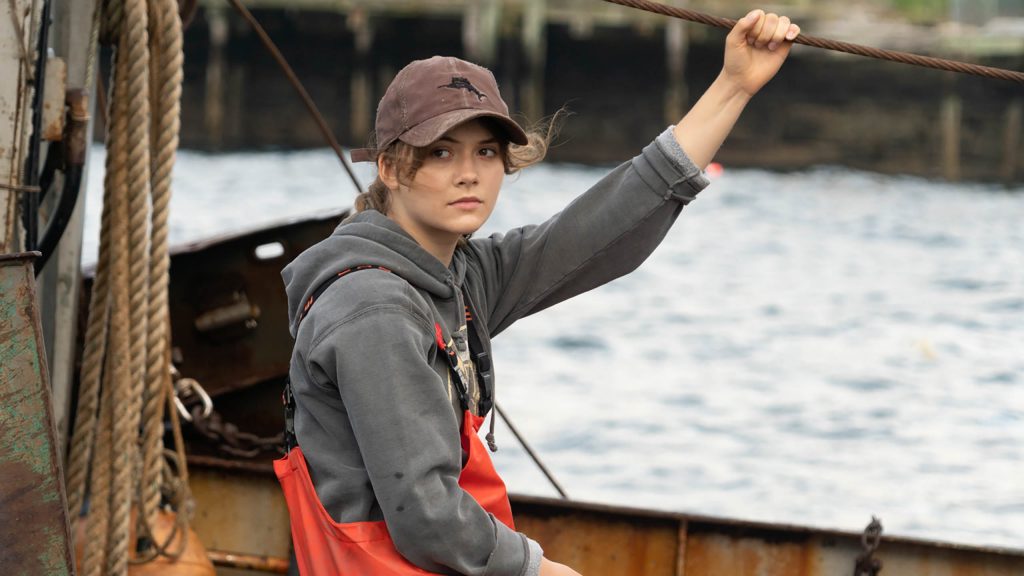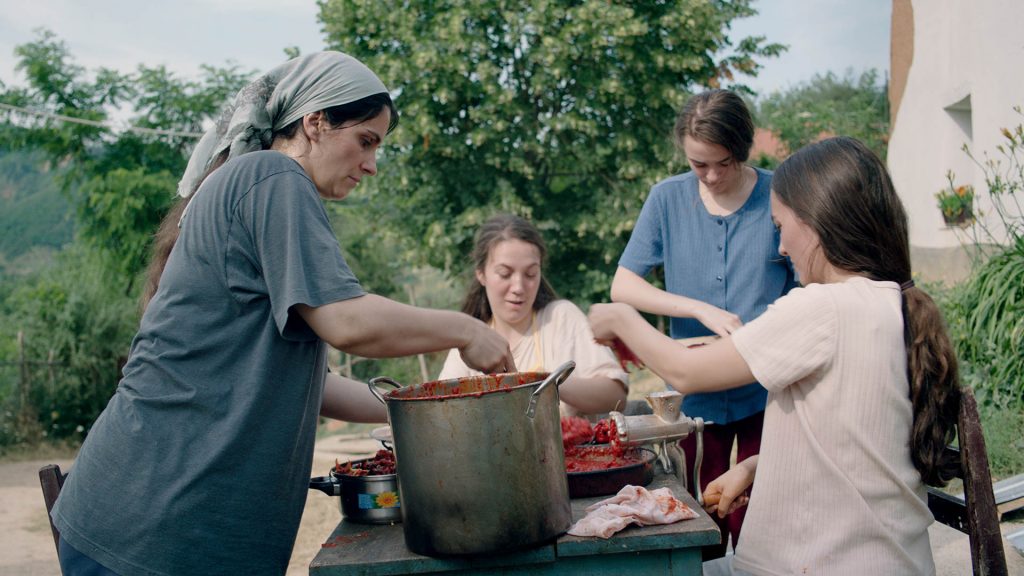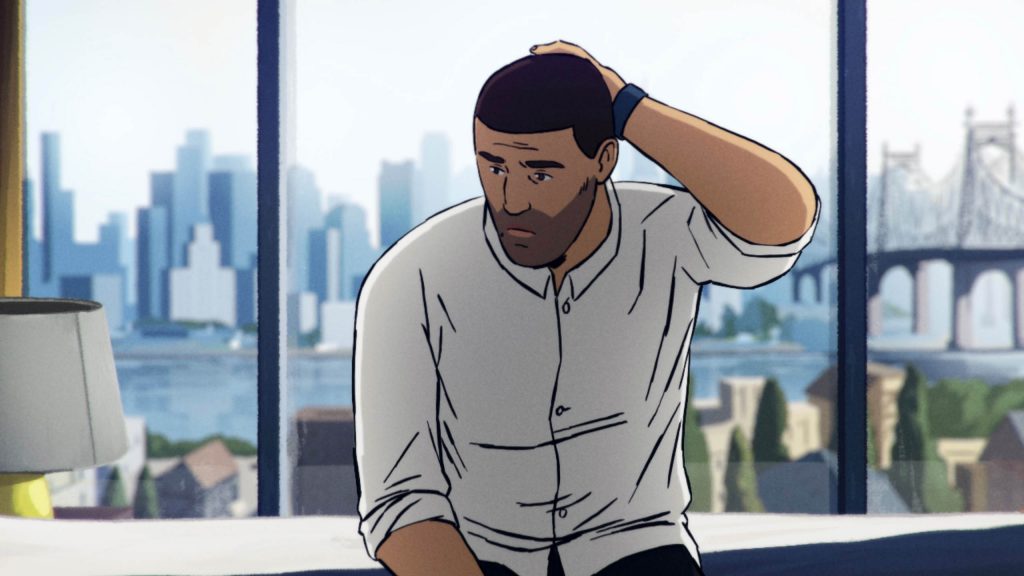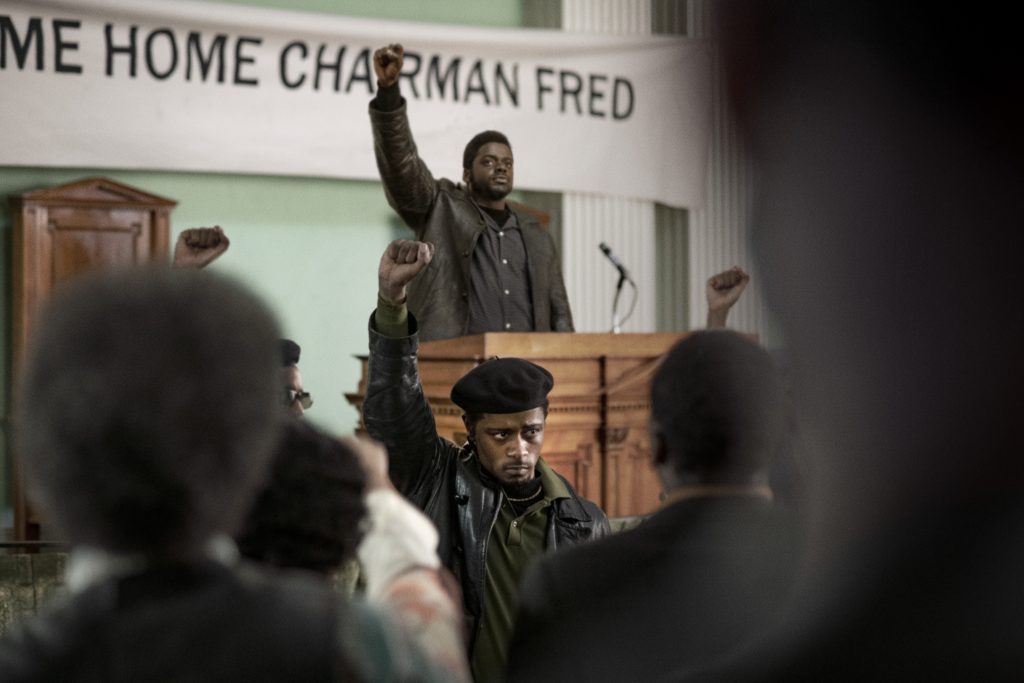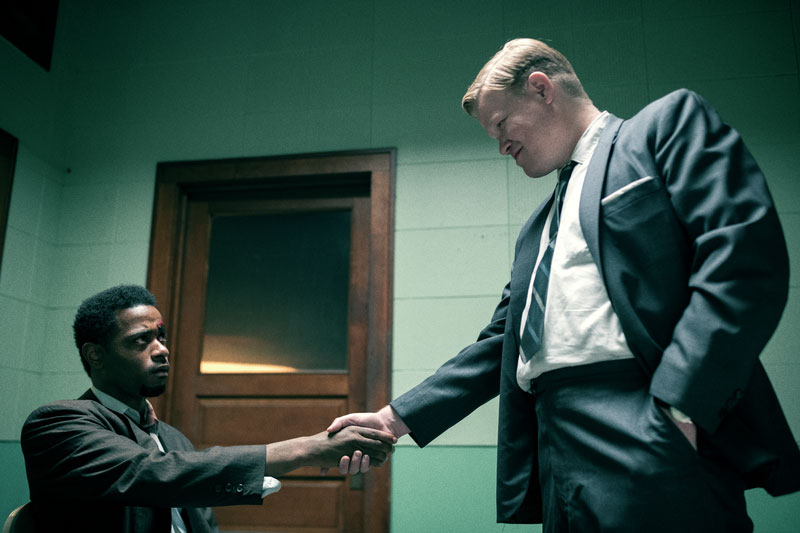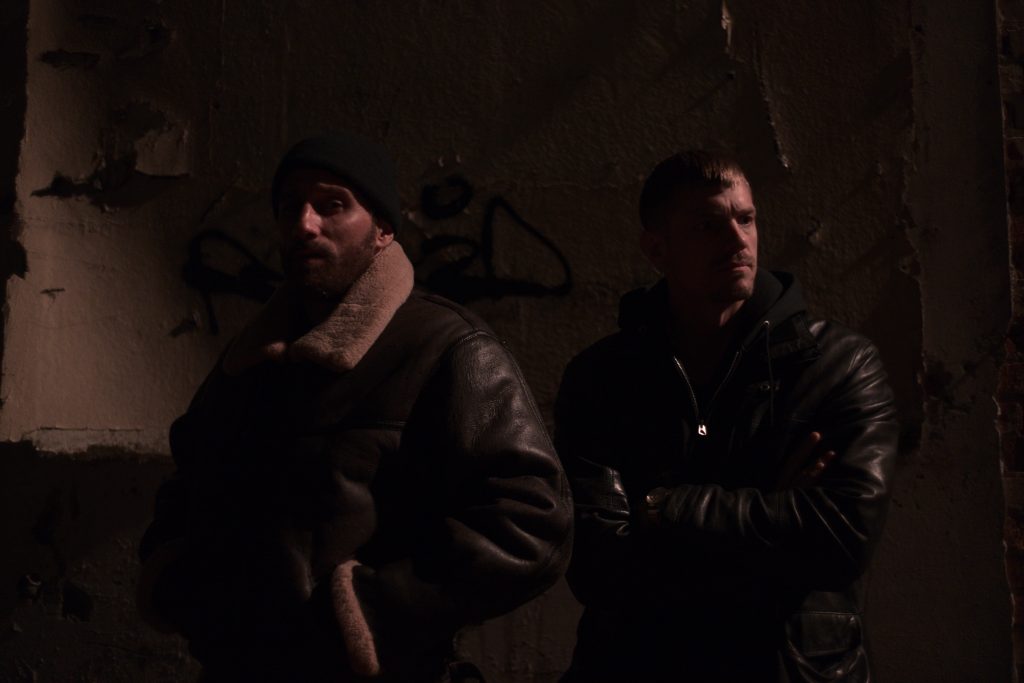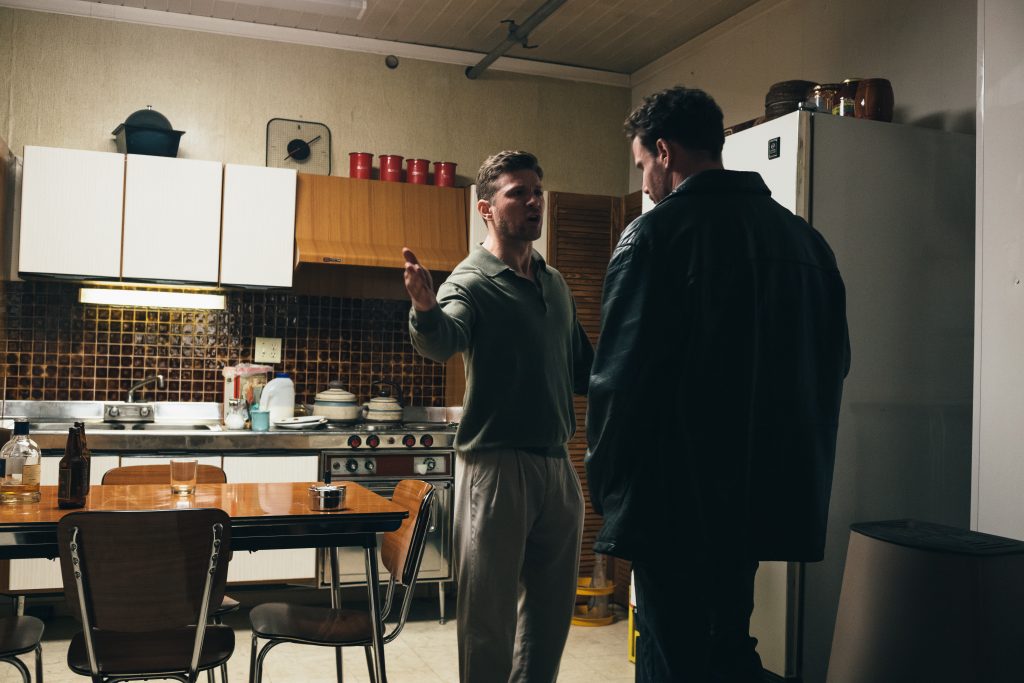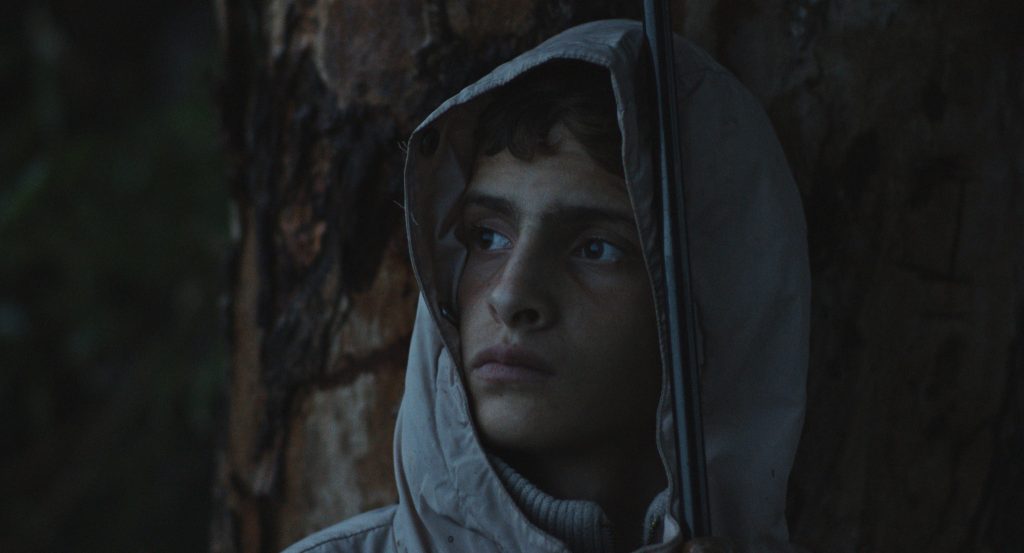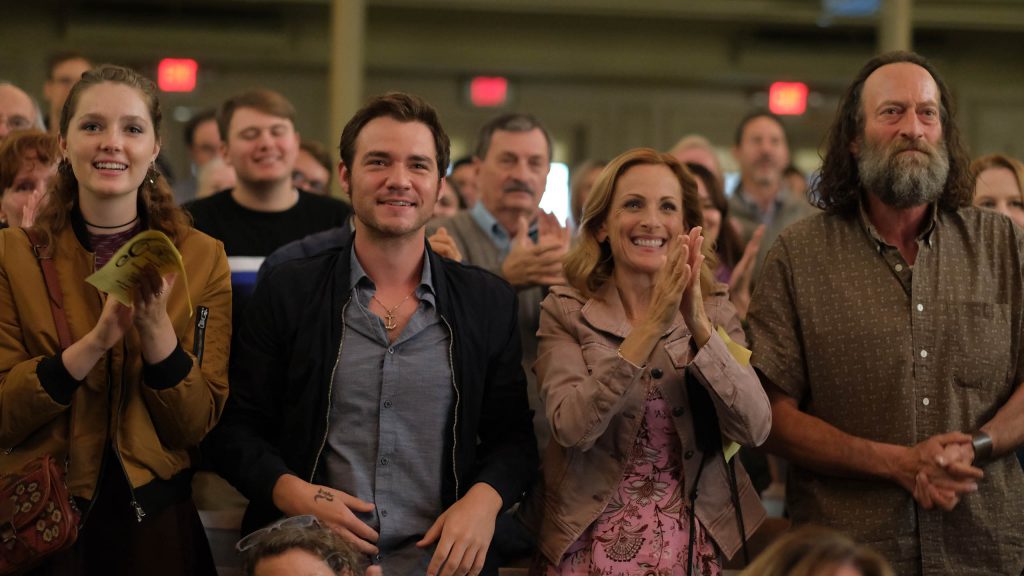February 3, 2021
by Carla Hay
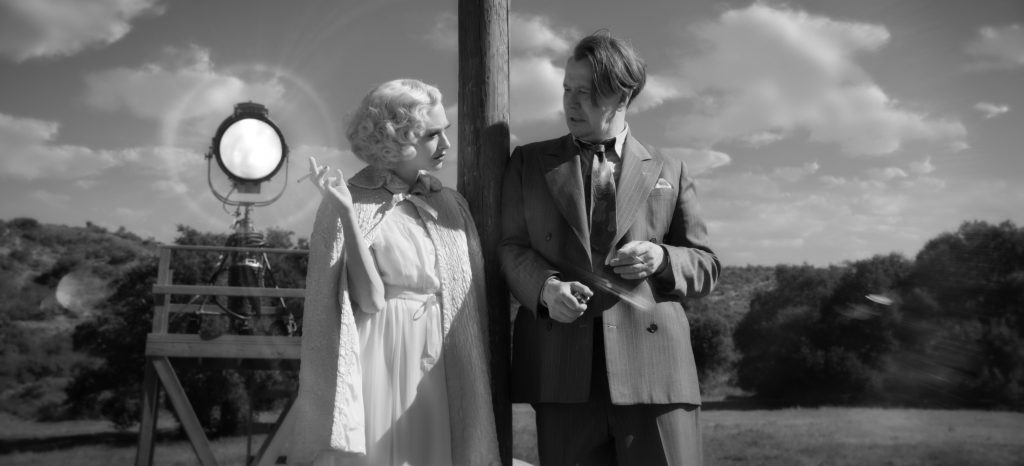
With six nominations, Netflix’s movie-industry drama “Mank” is the leading contender for the 78th Annual Golden Globe Awards, which will be presented on February 28, 2021. The Golden Globes ceremony has traditionally been held at the Beverly Hilton Hotel in Beverly Hills, California. However, due to the COVID-19 pandemic, there will be no large, in-person gathering at the ceremony. Instead, the Golden Globes ceremony will like do what other major live televised award shows have done when going virtual during the pandemic: There will most likely be video linkups of the nominees, so that when the winners are announced, the winners can react live with their acceptance speeches. Tina Fey and Amy Poehler will host the ceremony, with Fey at the Rainbow Room in New York City and Poehler at the Beverly Hilton.
NBC has the U.S. telecast of the show, which begins at 8 p.m. ET/5 p.m. PT. The Hollywood Foreign Press Association (HFPA) votes for the nominations and awards. The HFPA and Dick Clark Productions are producing the Golden Globe Awards telecast. Eligible movies for the show were those released in the U.S. in 2020 and in January and February 2021. The eligibility window, which usually ends at the end of a calendar year, was extended for movies because of the COVID-19 pandemic. Eligible TV programs were those that premiered on U.S. networks and U.S. streaming services in 2020.
“Mank” tells the story of movie screenwriter Herman J. Mankiewicz (nicknamed Mank) and his experiences while he co-wrote the 1941 classic “Citizen Kane,” including his clashes with “Citizen Kane” director Orson Welles. “Mank” picked up expected nominations in the Motion Picture – Drama categories: Best Picture and Best Actor (Gary Oldman). The other “Mank” nominations are for Best Director (David Fincher), Best Screenplay (the late Jack Fincher, David’s father), Best Supporting Actress (Amanda Seyfried) and Best Original Score (Trent Reznor and Atticus Ross). Another movie contender with multiple nominations is Netflix’s “The Trial of the Chicago 7,” with five nods. Focus Features’ “Promising Young Woman,” Sony Pictures Classics’ “The Father” and Searchlight Pictures’ “Nomadland” have four nominations each. “One Night in Miami…” and “Borat Subsequent Moviefilm” (both from Amazon Studios) earned three nods each.
For the television categories, the leading contender is Netflix’s “The Crown,” which received six nominations, including Best Television Series – Drama. Following closely behind is the Pop network’s comedy series “Schitt’s Creek,” which scored five nominations, including Best Television Series – Comedy. The Netflix drama series “Ozark,” the HBO limited series “The Undoing” and the Netflix limited series “Ratched” received four nominations each.
Snubs and Surprises

The most noticeable Golden Globes snub this year was Netflix’s award-winning, critically acclaimed drama movie “Da 5 Bloods” (directed and co-written by Spike Lee), which failed to get any Golden Globe nominations. “Da 5 Bloods” told a fictional story about four African American military veterans of the Vietnam War who go back to Vietnam to look for hidden treasure. Other movies that have been shut out of the Golden Globes race are the Focus Features drama “Never Rarely Sometimes Always,” the A24 drama “First Cow” and the Netflix comedy “The Forty-Year-Old Version,” which have all received several nominations and some wins at independent film awards. Golden Globe TV snubs this year included the Hulu limited drama series “Little Fires Everywhere” and the HBO comedy series “Insecure,” which each received several Emmy nods. Also shut out was the HBO limited drama series “I May Destroy You.”
In terms of surprises, some movies picked up their first major award nominations, despite being shut out of earlier award shows for which they were eligible. Vertical Entertainment’s “Music” is one such example, by receiving two Golden Globe nods in the Motion Picture – Musical or Comedy field: Best Picture and Best Actress (Kate Hudson). Netflix’s star-studded musical “The Prom,” which got mixed reviews from critics and audiences, also scored two nods in the Motion Picture – Musical or Comedy field: Best Picture and Best Actor (James Corden). After getting snubbed in major Emmy Awards categories in 2020, Hulu’s comedy series “The Great” did better than expected at the Golden Globes for the “The Great’s” first season: “The Great” scored three nominations in the Best Television Series – Musical or Comedy field: Best Television Series, Best Actress (Elle Fanning) and Best Actor (Nicholas Hoult).
Diversity and Inclusion

In terms of diversity, the Golden Globes ended a long drought of not nominating any female directors. This year, women are three of the five Best Director nominees: Chloé Zhao for “Nomadland,” Regina King for “One Night in Miami …” and Emerald Fennell for “Promising Young Woman.” Zhao and Fennell are also nominees in another traditionally male-dominated Golden Globes category: Best Screenplay.
The major movie categories each had at least one person of color as a nominee, except for two categories: Best Actress in a Motion Picture – Musical or Comedy and Best Supporting Actress. Black people are the people of color with the highest representation this year.
In the movie categories, there are nominations for “One Night in Miami…” and Netflix’s “Ma Rainey’s Black Bottom,” which are both based on plays written by and about African Americans. “Ma Rainey’s Black Bottom” has two nominations in the Motion Picture – Drama field: Best Actress (for Viola Davis) and Best Actor (for the late Chadwick Boseman). Daniel Kaluuya’s portrayal of Black Panther activist Fred Hampton in Warner Bros. Pictures’ “Judas and the Black Messiah” garnered a nod for Best Actor in a Supporting Role in Any Motion Picture. “The United States vs. Billie Holiday,” earned two nominations for star Andra Day: Best Actress in a Motion Picture – Drama and Best Original Song. In the category of Best Original Song, three of the five nominated songs were written and performed by African Americans: Day’s “Tigress & Tweed”; Leslie Odom Jr.’s “Speak Now” (from “One Night in Miami…”); and H.E.R.’s “Fight for You” (from “Judas and the Black Messiah”).
STX’s “The Mauritanian,” which is about a suspected terrorist imprisoned in Cuba’s Guantanamo Bay, stars Algerian French actor Tahar Rahim, who is nominated for Best Actor in a Motion Picture – Drama.
Asian representation at the Golden Globes this year is mostly from “Nomadland” filmmaker Zhao, who is nominated as a director, producer and screenwriter for the film. Riz Ahmed, who is of Pakistani British heritage, is nominated for Best Actor in a Motion Picture – Drama, for his role in Amazon Studios’ “Sound of Metal,” where he portrays an American heavy metal drummer who goes deaf. Indian British actor Dev Patel of Searchlight Pictures’ “The Personal History of David Copperfield” got a nod for Best Actor in a Motion Picture – Musical or Comedy. A24’s “Minari,” about a Korean American family who moves to rural Arkansas, is nominated for Best Foreign Language Film.
Latinos, who were mostly shut out of the Golden Globes this year, are represented only by Shudder’s Guatemalan horror movie “La Llorona” (nominated for Best Foreign Language Film) and by “Hamilton” star/creator Lin-Manuel Miranda (who is Puerto Rican American descent), who got nominations for Best Actor in a Motion Picture – Musical or Comedy, while “Hamilton” (which has a multiracial cast) was nominated for Best Motion Picture – Musical or Comedy. “Hamilton,” which is a filmed 2016 performance of the Tony-winning musical, is available exclusively on the Disney+ streaming service and is not eligible for the Oscars because the movie was never released in theaters.
People of color are underrepresented in the TV categories. Almost all of the nominees are white in most of the TV categories this year. Black people got the most nominations in the the TV categories because of Amazon Prime Video’s limited series “Small Axe” (about Caribbean immigrant life in England), which picked up two nods: Best Television Limited Series or Motion Picture Made for Television, while “Small Axe” star John Boyega is nominated for Best Performance by an Actor in a Supporting Role in a Series, Limited Series or Motion Picture Made for Television.
African American actor Don Cheadle of Showtime’s “Black Monday” is nominated for Best Performance by an Actor in a Television Series – Musical or Comedy. HBO’s “Lovecraft Country,” which has a predominantly African American cast, is up for Best Television Series – Drama, although that is the only Golden Globe nomination it received this year.
Egyptian American actor Ramy Youssef from Hulu’s “Ramy” is nominated for Best Actor in a Television Series – Musical or Comedy, an award he won in 2020. Native Americans, who are severely underrepresented in entertainment, received no nominations in any of the Golden Globe categories this year.
Portrayals of the disabled community are in nominated performances by Ahmed in “Sound of Metal” (about a musician who goes deaf) and Anthony Hopkins as a man with dementia in Sony Pictures Classics’ “The Father.” Vertical Entertainment’s “Music,” about a recovering addict (played by Kate Hudson) raising her autistic teenage half-sister named Music (played by Maddie Ziegler), has sparked criticism over how autism is portrayed by Ziegler, who is not autistic, and for a controversial scene in which the autistic person is physically restrained. In television, Emmy-winning “I Know This Must Be True” star Mark Ruffalo portrays identical twins, one of whom has schizophrenia. For his role in this HBO limited drama series, Ruffalo is nominated for Best Actor in a Limited Series or Motion Picture Made for Television.
The LGBTQ community is represented in the movie categories with the musical “The Prom,” which is about a lesbian teenager who wants go to her school prom with her girlfriend. “The Prom,” directed and produced by Ryan Murphy (who is openly gay), is nominated for Best Motion Picture – Musical or Comedy, while James Corden (who plays a gay character in the movie) is nominated for Best Actor in a Motion Picture – Musical or Comedy. The French drama “Two of Us,” about two elderly lesbians, is nominated for Best International Film. And, as previously mentioned, “Ma Rainey’s Black Bottom” star Davis (who portrays lesbian singer Ma Rainey) and “The United States vs. Billie Holiday” star Day (who depicts bisexual singer Billie Holiday) are each nominated for Best Actress in a Motion Picture – Drama.
In television, the Murphy-produced Netflix limited series “Ratched” earned nominations for lead actress Sarah Paulson and supporting actress Cynthia Nixon, who are both openly lesbian/queer. Murphy is also nominated as an executive producer for “Ratched,” which is a contender for Best Television Series – Drama. Meanwhile, openly gay actor/writer/producer Dan Levy earned two nominations for “Schitt’s Creek”: Best Television Series – Musical or Comedy and Best Performance by an Actor in a Supporting Role in a Series, Limited Series or Motion Picture Made for Television. “Schitt’s Creek” (which has its series finale on the Pop Network in 2020) swept all the major categories for comedy TV series at the 2020 Emmy Awards, so it will be interesting to see how well “Schitt’s Creek” does at the Golden Globes.
Here is the complete list of nominations for the 2021 Golden Globe Awards:
MOVIES
Best Motion Picture – Drama
“The Father” (Sony Pictures Classics)
“Mank” (Netflix)
“Nomadland” (Searchlight Pictures)
“Promising Young Woman” (Focus Features)
“The Trial of the Chicago 7” (Netflix)
Best Motion Picture – Musical or Comedy
“Borat Subsequent Moviefilm” (Amazon Studios)
“Hamilton” (Disney+)
“Palm Springs” (Neon/Hulu)
“Music” (Vertical Entertainment)
“The Prom” (Netflix)
Best Director
Emerald Fennell, “Promising Young Woman”
David Fincher, “Mank” (Netflix)
Regina King, “One Night in Miami” (Amazon Studios)
Aaron Sorkin, “The Trial of the Chicago 7” (Netflix)
Chloé Zhao, “Nomadland” (Searchlight Pictures)
Best Actor in a Motion Picture – Drama
Riz Ahmed (“Sound of Metal”)
Chadwick Boseman (“Ma Rainey’s Black Bottom”)
Anthony Hopkins (“The Father”)
Gary Oldman (“Mank”)
Tahar Rahim (“The Mauritanian”)
Best Actor in a Motion Picture – Musical or Comedy
Sacha Baron Cohen (“Borat Subsequent Moviefilm”)
James Corden (“The Prom”)
Lin-Manuel Miranda (“Hamilton”)
Dev Patel (“The Personal History of David Copperfield”)
Andy Samberg (“Palm Springs”)
Best Actress in a Motion Picture – Drama
Viola Davis (“Ma Rainey’s Black Bottom”)
Andra Day (“The United States vs. Billie Holiday”)
Vanessa Kirby (“Pieces of a Woman”)
Frances McDormand (“Nomadland”)
Carey Mulligan (“Promising Young Woman”)
Best Actress in a Motion Picture – Musical or Comedy
Maria Bakalova (“Borat Subsequent Moviefilm”)
Kate Hudson (“Music”)
Michelle Pfeiffer (“French Exit”)
Rosamund Pike (“I Care a Lot”)
Anya Taylor-Joy (“Emma”)
Best Supporting Actor in a Motion Picture
Sacha Baron Cohen (“The Trial of the Chicago 7”)
Daniel Kaluuya (“Judas and the Black Messiah”)
Jared Leto (“The Little Things”)
Bill Murray (“On the Rocks”)
Leslie Odom Jr. (“One Night in Miami”)
Best Supporting Actress in a Motion Picture
Glenn Close (“Hillbilly Elegy”)
Olivia Colman (“The Father”)
Jodie Foster (“The Mauritanian”)
Amanda Seyfried (“Mank”)
Helena Zengel (“News of the World”)
Best Screenplay
“Promising Young Woman” (Focus Features) – Emerald Fennell
“Mank” (Netflix) – Jack Fincher
“The Trial of the Chicago 7” (Netflix) – Aaron Sorkin
“The Father” (Sony Pictures Classics) – Florian Zeller and Christopher Hampton
“Nomadland” (Searchlight Pictures) – Chloé Zhao
Best Original Score
“The Midnight Sky” – Alexandre Desplat
“Tenet” – Ludwig Göransson
“News of the World” – James Newton Howard
“Mank” – Trent Reznor and Atticus Ross
“Soul” – Trent Reznor, Atticus Ross, Jon Batiste
Best Original Song
“Fight for You” from “Judas and the Black Messiah” – H.E.R., Dernst Emile II, Tiara Thomas
“Hear My Voice” from “The Trial of the Chicago 7” – Daniel Pemberton, Celeste
“Io Si (Seen)” from “The Life Ahead” – Diane Warren, Laura Pausini, Niccolò Agliardi
“Speak Now” from “One Night in Miami” (Amazon Studios) – Leslie Odom Jr, Sam Ashworth
“Tigress & Tweed” from “The United States vs. Billie Holliday” (Hulu) – Andra Day, Raphael Saadiq
Best Animated Film
“The Croods: A New Age” (DreamWorks Animation/Universal Pictures)
“Onward” (Pixar Amination Studios/Disney)
“Over the Moon” (Netflix)
“Soul” (Pixar Animation Studios/Disney)
“Wolfwalkers” (Cartoon Saloon/Apple TV+)
Best Foreign Language Film
“Another Round” (Samuel Goldwyn Films)
“La Llorona” (Shudder)
“The Life Ahead” (Netflix)
“Minari” (A24)
“Two of Us” (Magnolia Pictures)
TELEVISION
Best Television Series – Drama
“The Crown” (Netflix)
“Lovecraft Country” (HBO)
“The Mandalorian” (Disney Plus)
“Ozark” (Netflix)
“Ratched” (Netflix)
Best Television Series – Musical or Comedy
“Emily in Paris” (Netflix)
“The Flight Attendant” (HBO Max)
“The Great” (Hulu)
“Schitt’s Creek” (Pop)
“Ted Lasso” (Apple TV+)
Best Actor in a Television Series – Drama
Jason Bateman (“Ozark”)
Josh O’Connor (“The Crown”)
Bob Odenkirk (“Better Call Saul”)
Al Pacino (“Hunters”)
Matthew Rhys (“Perry Mason”)
Best Actress in a Television Series – Drama
Olivia Colman (“The Crown”)
Jodie Comer (“Killing Eve”)
Emma Corrin (“The Crown”)
Laura Linney (“Ozark”)
Sarah Paulson (“Ratched”)
Best Actor in a Television Series – Musical or Comedy
Don Cheadle (“Black Monday”)
Nicholas Hoult (“The Great”)
Eugene Levy (“Schitt’s Creek”)
Jason Sudeikis (“Ted Lasso”)
Ramy Youssef (“Ramy”)
Best Actress in a Television Series – Musical or Comedy
Lily Collins (“Emily in Paris”)
Kaley Cuoco (“The Flight Attendant”)
Elle Fanning (“The Great”)
Jane Levy (“Zoey’s Extraordinary Playlist”)
Catherine O’Hara (“Schitt’s Creek”)
Best Television Limited Series or Motion Picture Made for Television
“Normal People” (Hulu/BBC)
“The Queen’s Gambit” (Netflix)
“Small Axe” (Amazon Prime Video/BBC)
“The Undoing” (HBO)
“Unorthodox” (Netflix)
Best Actor in a Limited Series or Motion Picture Made for Television
Bryan Cranston (“Your Honor”)
Jeff Daniels (“The Comey Rule”)
Hugh Grant (“The Undoing”)
Ethan Hawke (“The Good Lord Bird”)
Mark Ruffalo (“I Know This Much Is True”)
Best Actress in a Limited Series or Motion Picture Made for Television
Cate Blanchett (“Mrs. America”)
Daisy Edgar-Jones (“Normal People”)
Shira Haas (“Unorthodox”)
Nicole Kidman (“The Undoing”)
Anya Taylor-Joy (“The Queen’s Gambit”)
Best Supporting Actor in a Series, Limited Series or Motion Picture Made for Television
John Boyega (“Small Axe”)
Brendan Gleeson (“The Comey Rule”)
Dan Levy (“Schitt’s Creek”)
Jim Parsons (“Hollywood”)
Donald Sutherland (“The Undoing”)
Best Supporting Actress in a Series, Limited Series or Motion Picture Made for Television
Gillian Anderson (“The Crown”)
Helena Bonham Carter (“The Crown”)
Julia Garner (“Ozark”)
Annie Murphy (“Schitt’s Creek”)
Cynthia Nixon (“Ratched”)





